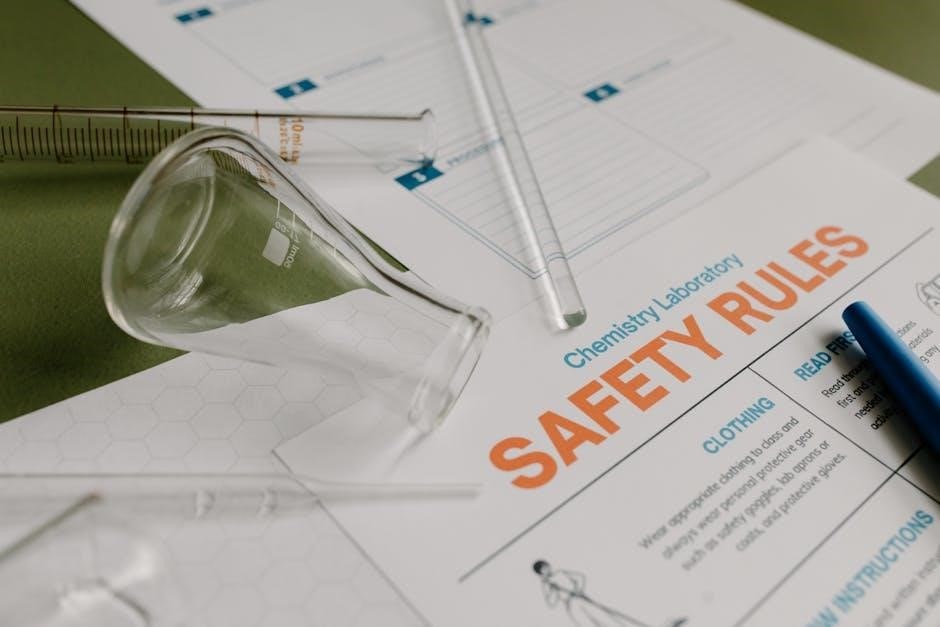The NCAA International Academic Standards Guide helps international student-athletes navigate eligibility requirements for NCAA schools․ It provides detailed academic standards, core courses, and documentation needed for certification․
Overview of the NCAA and International Student-Athletes
The NCAA governs intercollegiate athletics in the U․S․, supporting nearly 25,000 international student-athletes competing at its member schools․ These athletes enrich campus diversity and foster global understanding․ The NCAA provides resources to help international students navigate eligibility requirements, ensuring they meet academic and amateurism standards․ This guide is essential for students from abroad aiming to compete at NCAA schools, offering clarity on the process and expectations․ It highlights the NCAA’s commitment to inclusivity and supporting international athletes in achieving their academic and athletic goals․
Purpose of the International Academic Standards Guide
The purpose of the International Academic Standards Guide is to provide clarity on NCAA eligibility requirements for international student-athletes; It outlines academic standards, core courses, and documentation needed for certification․ The guide helps students understand the process of meeting eligibility criteria for Division I, II, or III schools․ It also serves as a resource for understanding amateurism requirements and submitting proper academic credentials․ This guide ensures international athletes are academically prepared and eligible to compete in the U․S․, fostering their success in both athletics and academics․
Key Benefits for International Student-Athletes
The NCAA International Academic Standards Guide offers clarity and guidance for international student-athletes seeking to compete in the U․S․ It simplifies the eligibility process, ensuring students meet academic requirements and understand documentation needs․ The guide provides country-specific academic guidelines, helping athletes prepare for NCAA standards․ It also outlines core course requirements and standardized test expectations, enabling students to plan their academic path effectively․ By streamlining the process, the guide empowers international athletes to focus on their athletic and academic goals while navigating the transition to U․S․ college athletics seamlessly․

Understanding the NCAA Eligibility Center
The NCAA Eligibility Center certifies academic and amateurism eligibility for international student-athletes․ It ensures athletes meet NCAA standards to compete at U․S․ colleges, simplifying the eligibility process․
Role of the NCAA Eligibility Center
The NCAA Eligibility Center plays a crucial role in certifying the academic and amateurism eligibility of prospective student-athletes․ It evaluates transcripts, test scores, and amateurism status to ensure compliance with NCAA standards․ For international students, the center provides specific guidelines and resources to navigate the eligibility process․ By verifying academic credentials and ensuring amateurism requirements are met, the Eligibility Center helps student-athletes seamlessly transition to competing at NCAA member schools․
Registration Process for International Student-Athletes
International student-athletes must register with the NCAA Eligibility Center to ensure eligibility․ They need to create an account, submit academic documents, and pay the registration fee․ Additional requirements may include translating documents and meeting country-specific guidelines, which can be found in the NCAA Guide to International Academic Standards․ The center provides resources to help navigate this process and ensure all criteria are met for participation in NCAA athletics․
Required Documentation for Eligibility
International student-athletes must provide official academic records, including transcripts, yearly grade reports, and leaving exam results․ Documents must be translated into English and submitted by the school․ Country-specific requirements are detailed in the NCAA Guide to International Academic Standards․ Ensuring all documents meet these standards is crucial for eligibility determination․

Academic Requirements for NCAA Eligibility
International student-athletes must meet specific academic standards to ensure eligibility․ The NCAA International Academic Standards Guide details these requirements, emphasizing core courses and grade point averages for certification․
Division I Academic Standards
Division I requires international student-athletes to meet rigorous academic standards․ They must complete a minimum of 16 core courses, including English, math, and science․ A minimum GPA of 2․3 in these courses is required for eligibility․ Additionally, standardized test scores, such as the SAT or ACT, must be submitted and meet specific thresholds․ These standards ensure student-athletes are academically prepared for college-level coursework․ The NCAA International Academic Standards Guide provides detailed criteria for each division, helping international athletes understand the requirements for eligibility and success․
Division II Academic Standards
Division II academic standards require international student-athletes to complete 16 core courses with a minimum GPA of 2․2․ Standardized test scores, such as SAT or ACT, must also meet specific thresholds․ While similar to Division I, Division II standards are slightly less rigorous․ Student-athletes must ensure their coursework aligns with NCAA requirements․ The NCAA International Academic Standards Guide provides detailed criteria for Division II eligibility, helping international athletes understand the academic expectations for participation in intercollegiate athletics at this level․
Division III Academic Standards
Division III academic standards focus on a student-athlete’s high school transcript and course completion․ While there are no minimum GPA or standardized test score requirements, international student-athletes must complete 16 core courses․ These courses must be comparable to U․S․ high school standards․ The NCAA Eligibility Center evaluates each transcript to ensure it meets Division III criteria․ The NCAA International Academic Standards Guide provides guidance on acceptable international credentials, helping athletes prepare for eligibility without the need for standardized test scores in Division III․

Core Course Requirements
The NCAA International Academic Standards Guide outlines core course requirements for international student-athletes, ensuring they meet academic eligibility standards for college athletics․ These courses are essential for initial eligibility certification․
Division I Core Course Requirements
Division I requires international student-athletes to complete 16 core courses in high school, including English, math, science, and additional courses․ These courses must be NCAA-approved and meet specific grade requirements․ International students must ensure their coursework aligns with NCAA standards, as outlined in the NCAA International Academic Standards Guide․ The guide provides detailed criteria for course content and academic performance, helping student-athletes meet eligibility requirements for Division I schools․ Proper documentation and approval from the NCAA Eligibility Center are essential for certification․
Division II Core Course Requirements
Division II requires international student-athletes to complete 14 core courses in high school, including English, math, science, and additional academic courses․ These courses must be NCAA-approved and meet specific standards․ The guide outlines acceptable international qualifications and emphasizes the importance of proper documentation․ Student-athletes must ensure their coursework aligns with NCAA requirements to maintain eligibility; The core courses are evaluated based on academic performance and must be completed by graduation․ This ensures international students meet Division II academic standards for participation in NCAA athletics․
Division III Core Course Requirements
Division III requires international student-athletes to complete 14 core courses in high school, similar to Division II․ These include English, math, science, and additional academic courses․ The NCAA Eligibility Center evaluates these courses for academic preparedness․ While Division III has no minimum GPA or standardized test requirements, completing the core courses ensures eligibility․ Documentation must be submitted to verify coursework completion․ This process helps international students meet Division III academic standards and participate in NCAA athletics․ Proper documentation is essential for certification․
Standardized Test Requirements
International student-athletes must submit SAT or ACT scores for NCAA eligibility․ The NCAA Eligibility Center evaluates these scores to ensure academic preparedness for college coursework․
SAT Requirements for International Student-Athletes
International student-athletes must meet specific SAT score requirements for NCAA eligibility․ Currently, the minimum SAT score for NCAA eligibility is 1010 for Division I and 920 for Division II․ These scores must be submitted directly from the College Board to the NCAA Eligibility Center․ The SAT requirements are part of the academic standards ensuring student-athletes are prepared for college-level coursework․ Meeting these scores helps international athletes qualify for eligibility, enabling them to compete and receive scholarships in the United States․
ACT Requirements for International Student-Athletes
International student-athletes must meet specific ACT score requirements for NCAA eligibility․ The minimum ACT composite score is 68 for Division I and 62 for Division II․ Scores must be sent directly from ACT to the NCAA Eligibility Center․ These requirements ensure students are academically prepared for college coursework․ Meeting the ACT standards is crucial for eligibility, allowing international athletes to compete and pursue scholarships in the U․S․ Students should verify the most up-to-date requirements, as they are subject to change․

Handling International Academic Credentials
International academic credentials must be translated and certified for NCAA eligibility․ The guide outlines country-specific requirements, ensuring proper document submission and verification for student-athletes․
Translating and Submitting Academic Documents
International student-athletes must submit official academic documents, including transcripts and exam results, to the NCAA Eligibility Center․ Documents in languages other than English require certified translations․ Translations must be completed by authorized entities, such as school officials or professional translation services․ Once translated, documents should be submitted via email from an official school email address․ The NCAA Eligibility Center verifies the authenticity of these documents to ensure compliance with academic standards․ Proper submission of translated and certified documents is crucial for determining eligibility․ Detailed guidelines are available in the NCAA Guide to International Academic Standards․
Country-Specific Academic Requirements
The NCAA Guide to International Academic Standards provides country-specific requirements for academic credentials․ Each country has unique academic systems, and the guide outlines acceptable graduation credentials, such as diplomas or exam results․ For example, students from Canada must submit provincial diplomas, while those from the UK may need A-level results․ The guide ensures international student-athletes understand the academic standards required for NCAA eligibility․ It also specifies which documents are accepted and how they must be submitted․ This helps streamline the process for students from diverse educational backgrounds to meet NCAA eligibility criteria effectively․
Initial-Eligibility Process
The initial-eligibility process involves registering with the NCAA Eligibility Center, submitting required academic documents, and meeting academic and amateurism standards to ensure eligibility for NCAA competition․
Steps to Ensure Academic Eligibility
International student-athletes must register with the NCAA Eligibility Center early, complete core courses, and maintain a minimum GPA․ Ensure all academic documents, including transcripts and exam results, are translated and submitted correctly․ Monitor the task list in the NCAA Eligibility Center account for required actions․ Meet country-specific academic requirements and deadlines․ Verify amateurism certification and avoid violations․ Stay informed through the NCAA Guide to International Academic Standards for Athletics Eligibility to navigate the process smoothly and ensure compliance with all eligibility criteria․
Timeline for Submitting Documentation
International student-athletes should register with the NCAA Eligibility Center early, ideally during their junior year․ Submit all required academic documents, including translated transcripts and exam results, by the deadline․ Ensure core courses and academic standards are met before graduation․ Monitor the task list in the NCAA Eligibility Center account for updates․ Submit final transcripts and proof of graduation after completing secondary school․ Allow 6-8 months for processing․ Stay informed about country-specific deadlines and requirements to avoid delays in eligibility certification․ Plan ahead to meet all submission timelines accurately․

Amateurism Certification
Amateurism certification ensures international student-athletes meet NCAA standards, maintaining amateur status for eligibility․ The NCAA Eligibility Center reviews all documentation to confirm compliance with amateurism requirements․
Understanding Amateurism Requirements
Amateurism certification ensures international student-athletes comply with NCAA rules, maintaining amateur status for eligibility․ The NCAA Eligibility Center reviews compensation, professional experience, and benefits received․ International athletes must avoid receiving payment or incentives tied to athletics performance․ Rules prohibit signing professional contracts or receiving benefits based on athletic ability․ Violations can result in ineligibility․ Understanding these requirements helps student-athletes maintain compliance and ensures they can compete at NCAA schools without jeopardizing their eligibility․ The guide provides clear guidelines to navigate amateurism rules effectively․
Impact of Amateurism on Eligibility
Amateurism violations can significantly impact eligibility, potentially disqualifying international student-athletes from NCAA participation․ Failure to meet requirements may result in ineligibility for scholarships, practice, or competition․ Maintaining amateur status ensures fair competition and preserves the integrity of college athletics․ The NCAA Eligibility Center carefully reviews each case, and violations can lead to penalties or loss of eligibility․ Compliance with amateurism rules is crucial for international athletes to secure opportunities in NCAA programs and fully engage in collegiate sports without restrictions or repercussions․ Understanding these implications is vital for a smooth transition into NCAA athletics․
Country-Specific Academic Guidelines
The NCAA provides tailored academic guidelines for students from various countries, ensuring compliance with eligibility requirements through specific credentials and documentation validation․
Guidelines for Students from Canada
Canadian student-athletes must meet specific academic requirements outlined in the NCAA International Academic Standards Guide․ They need to complete 16 core courses, maintain a minimum GPA, and achieve required SAT or ACT scores․ Documentation, including official transcripts and proof of graduation, must be submitted for eligibility․ The guide provides detailed instructions for Canadian students to ensure compliance with NCAA standards, facilitating a smooth transition to U․S․ colleges․ Proper preparation and submission of academic records are essential for certification․
Guidelines for Students from the United Kingdom
UK student-athletes must meet NCAA academic standards, including completing 16 core courses and achieving required test scores․ Documentation such as official A-level or BTEC transcripts and exam results must be submitted․ The NCAA Guide provides specific requirements for UK students, ensuring compliance with eligibility standards․ Proper preparation and submission of academic records are crucial for certification․ Understanding these guidelines helps UK students navigate the process smoothly and meet all necessary requirements for NCAA eligibility․
Guidelines for Students from Australia
Australian student-athletes must meet NCAA academic requirements, including completing 16 core courses and submitting official transcripts from certified institutions․ The NCAA accepts Australian Tertiary Admission Rank (ATAR) scores for eligibility․ Proper documentation, such as Higher School Certificates or equivalent qualifications, must be translated and submitted․ The NCAA Guide provides specific instructions for Australian students, ensuring compliance with academic standards․ Understanding these guidelines helps Australian athletes meet all necessary requirements for NCAA eligibility and compete at U․S․ colleges effectively․
Guidelines for Students from Other Countries
International student-athletes from countries outside the U․S․, Canada, U․K․, and Australia must adhere to NCAA guidelines tailored to their educational systems․ The NCAA provides country-specific requirements, ensuring fair evaluation of academic credentials․ Students must submit official transcripts, exam results, and proof of graduation, with documents translated if necessary․ The NCAA Guide outlines acceptable qualifications and documentation for each country, helping athletes meet eligibility standards․ Proper submission of these materials ensures a smooth certification process and maintains compliance with NCAA academic policies․

Transcripts and Academic Documentation
International student-athletes must submit official transcripts, grade reports, and exam results․ Documents must be certified and translated if not in English, ensuring authenticity for NCAA eligibility review․
Preparing Transcripts for Submission
International student-athletes must obtain official transcripts from their schools, ensuring all academic records are complete and accurate․ Transcripts should include grades, course titles, and exam results․ For non-English documents, certified translations are required․ The NCAA Eligibility Center mandates that transcripts be submitted directly by the school or via secure electronic methods․ Students should verify country-specific requirements for formatting and certification․ Proper preparation ensures timely processing and avoids delays in eligibility determination․ Organizing documents early is crucial for a smooth submission process․
Submitting Transcripts to the NCAA
International student-athletes must submit official transcripts to the NCAA Eligibility Center for review․ These documents should be sent directly by the school or through secure electronic platforms to ensure authenticity․ For non-English records, certified translations are required to meet NCAA standards․ Additionally, country-specific requirements may apply, so checking the NCAA’s guidelines for your country is essential․ Accuracy is crucial to avoid delays, so double-checking all documents before submission is recommended․ Timely submission ensures that the eligibility process proceeds smoothly and meets all necessary deadlines․

Appeals and Waivers
The NCAA allows international student-athletes to appeal eligibility decisions or request waivers under specific circumstances, ensuring fair consideration of unique academic or personal situations․
Understanding the Appeals Process
The NCAA Eligibility Center handles appeals for international student-athletes whose initial eligibility decisions are disputed․ The process involves submitting additional documentation or evidence to support the appeal․ The International Student Records Committee (ISRC) reviews cases to ensure fair consideration of unique circumstances․ Appeals must be filed within a specified timeframe and follow detailed guidelines outlined in the NCAA Guide to International Academic Standards․ This process ensures that all decisions are made with careful review of academic and personal circumstances, providing a pathway for resolving eligibility disputes effectively․
When to Request a Waiver
A waiver may be requested if an international student-athlete faces extenuating circumstances that prevent meeting NCAA academic or amateurism standards․ Common reasons include academic deficiencies due to educational system differences or language barriers․ The NCAA Eligibility Center reviews waiver requests, considering documentation such as academic records or personal statements․ Waivers are typically sought when standard requirements cannot be met, ensuring fair opportunities for eligibility․ International athletes should consult the NCAA Guide and their advisors to determine if a waiver is appropriate and to prepare a compelling case for review․
Resources for International Student-Athletes
The NCAA provides comprehensive resources, including the NCAA Guide to International Academic Standards, to assist student-athletes with eligibility processes and academic preparation․ Additional tools like country-specific documentation guides and online portals offer detailed support for international applicants․ These resources ensure a smooth transition to U․S․ college athletics by clarifying requirements and offering step-by-step guidance tailored to international students’ unique needs․
NCAA Guide to International Academic Standards
The NCAA Guide to International Academic Standards is a comprehensive resource designed to assist international student-athletes in understanding eligibility requirements․ It outlines core course requirements, standardized test expectations, and documentation needed for certification․ The guide provides detailed information on academic standards for Division I, II, and III schools, ensuring international students meet all necessary criteria․ Additionally, it offers country-specific guidelines, addressing unique educational systems worldwide․ This guide serves as a step-by-step roadmap, helping international athletes navigate the NCAA eligibility process effectively and efficiently․
Additional Support for International Athletes
The NCAA offers additional support for international athletes through resources like the NCAA Eligibility Center and dedicated counseling services․ These resources help navigate academic and amateurism requirements, ensuring compliance․ International athletes can also access country-specific guides and tools, such as the NCAA Guide to International Academic Standards, to understand documentation needs․ Furthermore, the NCAA provides support for cultural adaptation and language barriers, helping international athletes thrive academically and athletically in the U․S․ These resources ensure a smooth transition and successful integration into college athletics․